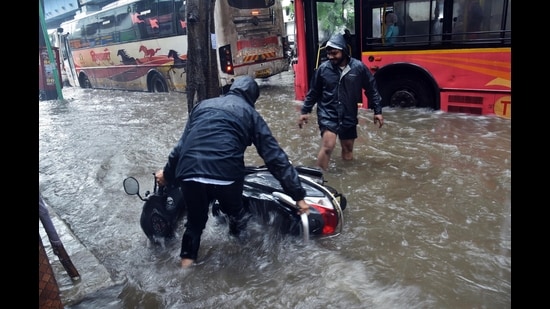Infection
Leptospirosis: All you need to know
As the city is seeing a rise in cases, experts break down this disease that the monsoon has brought in
The rain brings with it several infections and illnesses due to dirty water and an increase in bacteria and insects which is collectively known as monsoon-related illnesses. They include malaria, dengue, gastroenteritis, and viral infections. Leptospirosis, one of the most common zoonotic diseases, is spreading in the city. Also known as Weil’s disease, it can be contracted if one comes into contact with water, soil or food that is contaminated with animal faeces.

Causes
One of the main causes of leptospirosis is wading through dirty water that has got collected in areas after a particularly heavy bout of rainfall in an area. One can get infected by consuming unwashed fruits and vegetables or coming in contact with animal excreta. “The bacteria enter the body via the skin and mucous membrane, reach the gut, and spreads into the bloodstream leading to an infection,” explains Dr Santosh Kumar Agrawal, Senior Consultant, Internal Medicine, Marengo Asia Hospital, Faridabad.
Who can get infected?
People walking through waterlogged roads, kids playing in muddy fields, veterinarians or those working in slaughterhouses, and sewers come in contact with contaminated water. Swimming in lakes or ponds that is unclean can also lead to people being infected. People walking barefoot, through roads that have piles of garbage, are more prone to infection.
Symptoms
The symptoms of leptospirosis can occur after an incubation period ranging from 5-14 days. In more mild cases of the disease, “patients generally present with a high-grade fever, respiratory issues and chills,” says Dr Umang Agrawal, Infectious Diseases Consultant, P. D. Hinduja Hospital & MRC, Mumbai.
Whereas, those with a severe infection, the disease can affect their kidney or lungs as well. One can have body aches, jaundice and sometimes a decrease in urine output. Leptospirosis can also cause a drop in the blood platelet count.
However, Dr Mala Kaneria, Consultant, Infectious Diseases, Jaslok Hospital & Research Centre, Mumbai, says, “Many of the symptoms and signs of leptospirosis overlap with that of malaria and may cause a diagnostic dilemma. Other infections affecting the liver may also cause a presentation similar to those of Weil’s disease.”
It is important to note that there is no particular age group that this disease affects. Anyone can get infected however, those who are immunocompromised or the elderly can suffer a more severe bout of leptospirosis.
Precaution and Cure
To keep this infection at bay, Dr Santosh Kumar Agrawal suggests basic hygiene examples including washing food thoroughly under running water thoroughly, along with cleaning one’s hands and feet with soap and water if exposed to dirty water. He also suggests wearing protective gear if one goes outside and sticking to water that is boiled and purified.
One can get a blood test to diagnose this disease. However, definitive diagnostic tests for leptospirosis may have a false negative “as some tests are positive within the first seven days of illness and some are positive after seven days,” says Dr Mala Kaneria, adding, “A constellation of signs, symptoms and suggestive blood tests may enable a diagnosis in the absence of negative definitive tests.”
On the basis of the severity of the disease, antibiotics are prescribed. Consult a physician as soon as possible if there is a fever that isn’t responding to antibiotics as one may have to be hospitalised if the infection persists.

